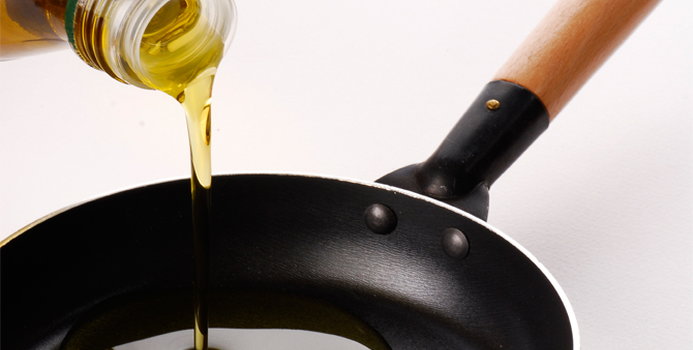There has been a pervasive idea that heating olive oil removes the health benefits, but as long as you keep your olive oil below the smoke point and store appropriately, you are still getting good nutrition, even when you cook at higher temperatures!
Monounsaturated fats are one of the best parts of olive oil and are not as impacted by heat at previously thought. The nutritional value of the oil stays until you reach the smoke point of the oil, which for high quality, low acidity olive oil is on the higher end, at around 405 °F. Lower quality olive oils may have a smoke point on the lower end, or between 375-405°F.
When olive oil starts to smoke/reach the 'smoke point', the properties of the oil change. When your oil starts smoking, oxidation occurs and carcinogenic free radicals form. The smoke point will be higher for better quality extra virgin olive oils than some of the lower quality olive oils stored in clear containers. But even for deep frying, temperatures tend to stay below that, around 250- 350°F, which is well below the smoke point for olive oil. Avoid reusing oil to fry in, the smoke point becomes lower for previously heated oils.
For easy assessment, you can look at the color of the oil, the lighter the color the higher the smoke point. As long as you keep any eye on whatever you are cooking and/or check the temperature of the oil you are frying in, the nutritional value remains.
However, how you store olive oil can affect the quality of it. Generally, the fats and phytonutrients in olive oil can become affected by heat and light if they are stored in clear bottles, sitting in the sunshine or stored in the cupboard over your stove. This constant heat and opening of the bottle can cause the oil to become rancid. Store your olive oil at room temperature in a dark place and use within 6 months.
Virgin Olive Oil vs. Pure Olive Oil
The terms Virgin and Extra Virgin on olive oil bottles are referring to how much acid is in the oil. Extra Virgin olive oil has a lower acidity level and popular for its stronger flavor and aroma. It is noted for a fruitier flavor and a higher smoke point than pure, virgin or olive oil blends.
When a label says that the olive oil is light, this is just referring to the color and aroma of the oil, not of it being lower in calories or reduced fat content.
Benefits of Olive Oil
Olive oil does not have cholesterol but still has varying amounts of other fats, including saturated, polyunsaturated and monounsaturated fats. It even has some small amounts of omega 3s and omega 6s. Olive oil provides 10% of your Daily Value (DV) for vitamin E and vitamin K per tablespoon serving. It has about 120 calories per tablespoon, which can quickly add up if you are using a lot of oil to fry or sauté with.

Emily DeLacey MS, RD is a Registered Dietitian and currently working in Jamaica as a HIV/ AIDS Prevention Specialist. She attended Central Washington University for her Bachelor's Degree in Science and Dietetics and continued on after her internship to Kent State University for her Master's Degree in Science and Nutrition, with a focus on public health and advocacy. She served as a U.S. Peace Corps Volunteer in Malawi 2012-2014 working as a Community Health Advisor in a rural village, immersing in the joys of life without electricity or running water. She has been to 20+ countries and 47 of the 50 states in the US. Traveling, adventuring and experiencing new cultures has made her a passionate advocate for the equality of nutrition and wellness for all people.



